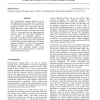Free Online Productivity Tools
i2Speak
i2Symbol
i2OCR
iTex2Img
iWeb2Print
iWeb2Shot
i2Type
iPdf2Split
iPdf2Merge
i2Bopomofo
i2Arabic
i2Style
i2Image
i2PDF
iLatex2Rtf
Sci2ools
ICML
2000
IEEE
2000
IEEE
A Bayesian Framework for Reinforcement Learning
The reinforcement learning problem can be decomposed into two parallel types of inference: (i) estimating the parameters of a model for the underlying process; (ii) determining behavior which maximizes return under the estimated model. Following Dearden, Friedman and Andre (1999), it is proposed that the learning process estimates online the full posterior distribution over models. To determine behavior, a hypothesis is sampled from this distribution and the greedy policy with respect to the hypothesis is obtained by dynamic programming. By using a different hypothesis for each trial appropriate exploratory and exploitative behavior is obtained. This Bayesian method always converges to the optimal policy for a stationary process with discrete states.
ICML 2000 | Machine Learning | Reinforcement Learning Problem | Trial Appropriate Exploratory | Underlying Process |
Related Content
| Added | 01 Aug 2010 |
| Updated | 01 Aug 2010 |
| Type | Conference |
| Year | 2000 |
| Where | ICML |
| Authors | Malcolm J. A. Strens |
Comments (0)

